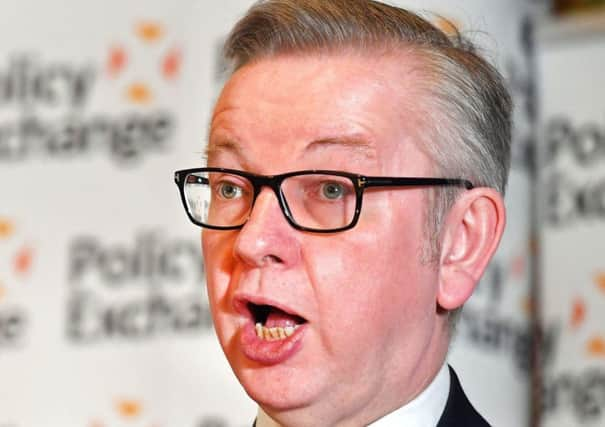Gove focus seems to be on animal welfare


With just eight months to go to a possible hard, no deal, Brexit he should be entirely focussed on getting in place the steps necessary to ensure a smooth transition for farming and food from 45 years of the CAP.
Instead he is apparently focused on voter-pleasing animal welfare issues. He has already assured special interest groups that high animal welfare standards on farms will be part of new farm support cross compliance rules.
Advertisement
Advertisement
In recent weeks he has announced legislation to ban the sale of puppies in pet shops, and more recently to outlaw the use of training collars that give dogs a mild electric shock. These are worthy aims, and doubtless they have gone down with the mainly English urban electorate he wants to influence. However this and other legislation on the environment will not have any impact on the economy.
Within his brief the only thing that can have a significant economic impact is ensuring that the farming and food industries continue to prosper after Brexit. If we are to have a hard Brexit next March, which many of Gove’s fellow Brexiteers would like, then management by priorities would dictate that the big issues rather than vote massaging ones are tackled first. Agriculture would be top of that list. But even within animal welfare he is picking the low hanging fruit and ignoring an issue that should be much higher on the agenda.
The British Veterinary Association (BVA) has been pressing successive farm ministers to ban non-stun slaughter, which is mainly for the production of halal meat. The problem is that it suits businesses that want some halal meat to sell to slaughter animals without stunning beyond those requirements. This is done for commercial reasons, and change would involve new regulations to either restrict the practice to religious reasons, or to insist that on supermarket shelves and in restaurants labelling shows not only where an animal was born, reared and slaughter – but how it was slaughtered. This is deemed culturally sensitive, but outside the EU Gove could make a stand with UK legislation.
This would be tackling an animal welfare issue that is swept under the bureaucratic carpet. If Gove and the government are serious about improving animal welfare after Brexit it needs to be right along the food chain. There is little sense in seeking kudos for improving standards on farms – where standards are already high – without insisting that they apply throughout the food chain.
Advertisement
Advertisement
Accepting the BVA suggestion would make sense, even if there are cultural sensitivities around halal meat. It would also give UK suppliers an edge when the government opens the market to cheap, imported food as part of trade deals. UK consumers need to be persuaded to pay a premium for local supplies. Guaranteeing high standards of animal welfare from farm to fork would create a much needed point of difference to imports.
Even if Gove continues to duck this issue, he does need to show more will determination manage the priorities in agriculture. After an initial flourish, when he did come up with some sound ideas on farm support and listened to the farming lobby, he seems to have lost interest. That is reflected in the harsh and universal criticism of the farming and food industries about the government’s plan for agriculture if we leave the EU in eight months time with no deal in place. That criticism seems to have fallen on deaf ears. This adds to a sense that the Conservative party is too focussed on its internal politics and too urban to focus on agriculture as it would have when the Tory shire MPs had real influence. This is perhaps why it is easier for Gove to go for soft issues, like companion animals, rather than prioritising the future of an industry that even in a UK context is one of the cornerstones of the economy. This is the opposite of management by priorities so far as farmers are concerned. But then given people’s current level of disillusion about politicians, perhaps by picking easy wins Gove is managing his priorities, even if they are for the party rather than the economy.